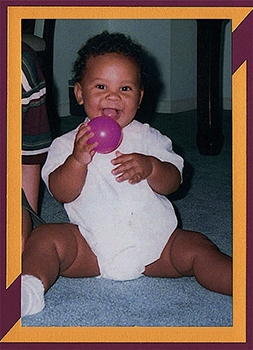Curating Grief

Today, I am now someone who I was not in the past.
Suffering loss has a way of jolting you out of a zone of oblivious comfort, while at the same time assaulting you on a deep emotional level. It is not a voluntary initiative. It is never something we choose. In fact it is diametrically opposed to our human nature.
In times past, I would never have given substantive thought to my mortality. We do not naturally lend ourselves to cataloguing the extent of our remaining days. It does go without saying, if we find ourselves facing a potentially terminal ailment, there is a significant increase in the clarity of how we view our life. However, this also happens when you are not the one facing a life-limiting condition.

Twenty-one years ago we lost our 19 month old son Isaac to a tragic accident. This year, on September 23rd 2019, he would have been 23 years old. More than old enough to have legally acquired his drivers licence and cast his vote in elections. Graduation from High School would have already been completed, and possibly even University. He may have had a girlfriend; someone who may be alive now, whom we will never meet. He would have had ample opportunity to laugh or cry, be sad or happy, or be angry or confused.
These are normal emotions we all have, long before turning the age of 23. Mourning the loss of a loved one, does not just entail everything up until their passing. We mourn their (and our) lost future as well; what could have been. What should have been.
I am not who I was 21 years ago. Twenty-one years ago, a knife went through this family’s collective heart, unbidden and without warning. The initial process of grieving was unfamiliar, decidedly alien. It felt not of this world. But, grief is so intrinsically a part of this fabric of life, that facing it always seems to cause us to question our reality; our mortality.
The pain borne out of the loss of a loved one, can be so intense as to be debilitating. While it has been said “time heals all wounds”, I would propose time “tempers” wounds instead. The acuteness of the pain may diminish with time, but there is a rule of investment we need to be aware of. The depth of love you carried for the person who passed away, will determine the depth you will experience grief. In short you are forever changed. You cannot go back to the way it was before. If you could, then the wound would be fully healed. So, because we cannot go back in time to change the outcome, time will never fully complete the healing process.
On the surface this may sound less than encouraging. In time, with loving care and support, it is possible to move forward in spite of the pain. Living a full, productive, hope-filled life, even with a heart scarred by loss, is attainable. Often it feels as if we could never experience such a life again, because of the deep pain we find ourselves in. It is ok to feel that way. Your loss is unique to you. Even if others have lost loved ones, they do not have complete knowledge on how you feel about your loss. They may have a sense of connection to your pain because of the unfortunate bond of loss you both share, but we each process our grief uniquely.
So, what is there to be done, if anything, about this burden we did not ask for? We can learn to reconcile the loss. It does not mean you deny your pain. In fact reconciliation not only acknowledges your pain, it also provides opportunity for healing the now changed person you are. Dreaming, laughing and hoping again is possible in time; but again, only as the changed person you are now, not the old you before the loss. Reconciliation allows us to continue the process of mourning our loss, even if we cannot attain the answers as to the why, or even how something so traumatizing as this transpired. As much as we would like to achieve a satisfactory conclusion to what is a very tiring process, there is no set time limit. You are allowed to process grief at your own pace.
Seven days ago, my cousin’s son-in-law passed away from cancer. He is survived by his wife and two daughters. The youngest who was born only a few days after her father died. My cousin is in pain for his daughter’s loss, just as he is in pain for himself. How does one reconcile the joy of a new birth and the sorrow of losing a husband, son-in-law, or father, in the span of one week? I believe that takes no small amount of prayer, and time. As long as is necessary. There is no set limit on reconciliation. Additionally, those grieving should never have to do so on their own. For us, faith, family and friends become our lifeline.
While working on a related chapter in my current manuscript, I wept bitterly as I took time to remember my son Isaac. I chose to engage in grief work. Yes, grieving is hard work, but necessary. It allows your mind, soul and body to continually adjust to your new normal. It is not a normal I would have chosen, but it happens to be my reality now.
Today is April 29th 2019. Twenty-one years of ongoing reconciliation have transpired. Have levels of healing taken place? Yes, in many ways, but at times I still feel pain; some very intense, even after 21 years. The pain you may be feeling now is normal. Whether you have just lost a loved one, or if it has been many years. You are free to grieve in your own way. So, how do you recognize when you are processing your grief in a healthy manner? There is one guideline we can follow. So long as you are not causing any direct harm to yourself, physical or otherwise, or to someone else, whatever expression of grief you have chosen, or more realistically, find yourself consumed with, then it is normal and ok. Some cry; some scream out loud; some get angry with God, while some have to engage in something physical, like gardening or chopping wood. Some grieve without any outward sign of emotion. Also be aware that as your journey of grief unfolds, do not be surprised if you find yourself behaving or thinking in a fashion which seems contrary to how you previously functioned prior to your loss. Remember, you have been affected on deep levels. You will need time to adjust.
Because each person suffering a loss grieves in their own way, you cannot curate or catalogue the process of grief and mourning. The pain of the loss of a loved one does not end, but its intensity can alleviate over time. The person in whom you invested your love has left a hole in your heart; a hole which outlines their shape; their memories; their life; their legacy. Do not let anyone try to tell you to get over that.
1st Thessalonians 4:13 (TPT) - Beloved brothers and sisters, we want you to be quite certain about the truth concerning those who have passed away, so that you won’t be overwhelmed with grief like many others who have no hope.
